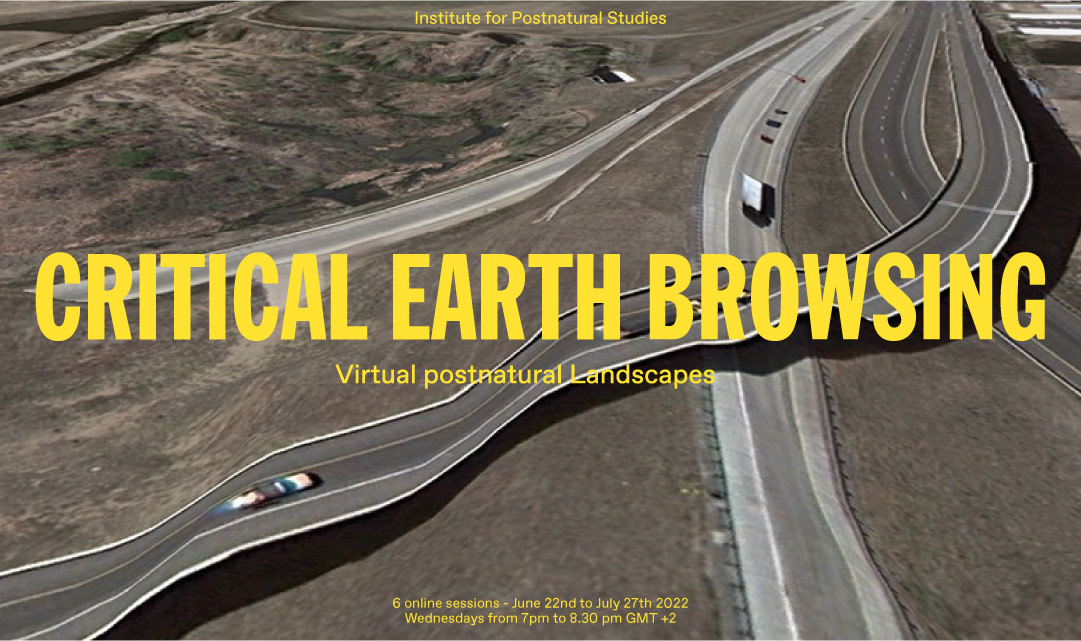Critical Hearth Browsing: Virtual Postnatural Landscapes
No. of Sessions
7 sessions
120 min. each
Date
Starting May 17th
to June 28th
Time
Tuesdays
19:00 to 21:00 GMT+1
Price
150€
Link

We want you to travel and think with us. We invite you to be part of our first virtual research group. Join us in the browsing and investigation of some of the most interesting, complex and intriguing postnatural landscapes through six virtual journeys.
We want you to travel and think with us. We invite you to be part of our first virtual research group. Join us in the browsing and investigation of some of the most interesting, complex and intriguing postnatural landscapes through six virtual journeys. From the Institute for Postnatural Studies we are launching our Critical Earth Browsing, an open research group to investigate the postnatural framework during one and a half months of virtual tours through some of the most interesting postnatural landscapes of the planet. From an experimental approach to academic and artistic research, combined with active participation and new modes of sharing experience in the digital media, we will examine concepts, territories and images related to contemporary ecologies. Mapping is never neutral, passive or without consequence, so it is important to abandon the tendency to understand maps in terms of what they represent, and rather focus on what they do. This research group will investigate not only landscapes and territories, but also navigational platforms, which as intermediary artifacts, move away from the notion of maps as static objects towards a new variety of territorial, political and psychological processes that generate space. New navigational and visualization platforms such as GoogleEarth are no longer solely compositional arrangements of objects and surfaces, they are in fact much more than that. CRITICAL EARTH BROWSING: Virtual Postnatural Landscapes will become an online platform where the experience of virtual spaces can no longer be separated from the complex geopolitical layers they obscure. Through this virtual research group we will navigate different territories to assemble a constellation of texts, screenshots, archival documents, videos and drawings. Critical EarthBrowsing is open to all publics. Thinkers, artists, researchers in any field are welcome.
Sessions
Session I
On Borders: Nature as a Cultural Construct Through national parks, nature reserves, infrastructures, and other landscapes that challenge the relationship between nature and culture, we will investigate how the idea of nature has always been linked to the creation of borders, of boundaries that divide and separate two realities that we must now rethink as a whole. This journey will explore a complex atlas of territories from which to discuss nature as a cultural construct, through its political ecologies and environmental aesthetics, behavioral boundaries, protocol barriers, and political and geopolitical limits.Session II
Archaeologies of Containment The concept of containment arises from the idea that isolation leads to stagnation, and has been central to territorial and political policies, materialized as a set of strategies and design techniques to avoid losses in storage facilities, usually of toxic, waste, radioactive, and harmful materials. In this context, we will travel around different disposal infrastructures; Postnatural architectures designed to confine waste and built to remain intact for thousands of years. These eternal monuments are the result of the political economies of selection of the territories where waste could, if not disappear, remain almost invisible, safe, and controlled.Session III
Landscapes of the Capitalocene If the Capitalocene addresses how our ecological crises have been precipitated not by humans in some undifferentiated and generalized way, but more specifically by the global spread of capitalism and its socio-economic-ecological injustices, a contemporary understanding of its territories must reflect the definitive abandonment of a romantic vision of landscape, and enter into the new post-natural territories as the new reality from which to act. Artificial deserts, infrastructural lakes, and waterfalls, mines, technological waste cemeteries, or territories derived from nuclear technology, as well as many other operations in the territory derived from modernity and which share the post-natural condition, require a new approach in the relations with our environments.Session IV
Sacrificio ‘Sacrificio’ is an interactive web project, a comprehensive work (Gesamtkunstwerk) that incorporates different arts such as music, sculpture, digital arts, architecture, and photography.This virtual environment emulates a part of the Chiribiquete, a site that some describe as the "Sistine Chapel" of the archeology of America. It is currently a protected park and considered one of the largest biodiversity centers in Colombia, and being a mixed heritage of UNESCO, it has the largest number of pictograms painted by indigenous communities in the region.
This project seeks to protect this majestic place by creating awareness about the decreasing biodiverse wealth due to our forms of production and consumption as humans in the world. Using technology to create this parallel universe that arises from digital scans and immersive music, we want to invite visitors to navigate in the new memories of this sacred place through a multidisciplinary art experience.
The flourishing of Sacrificio stems from the idea of multispecies respons-ability, from a tentacular thought that detracts from humanity's centrality and asks how we live in times of extinction, extermination and partial recovery (Van Dooren). It is also born of the recognition that we have never been the absolute center of the world and that a mourning for the environment should open us to an awareness of our (inter) dependence.





